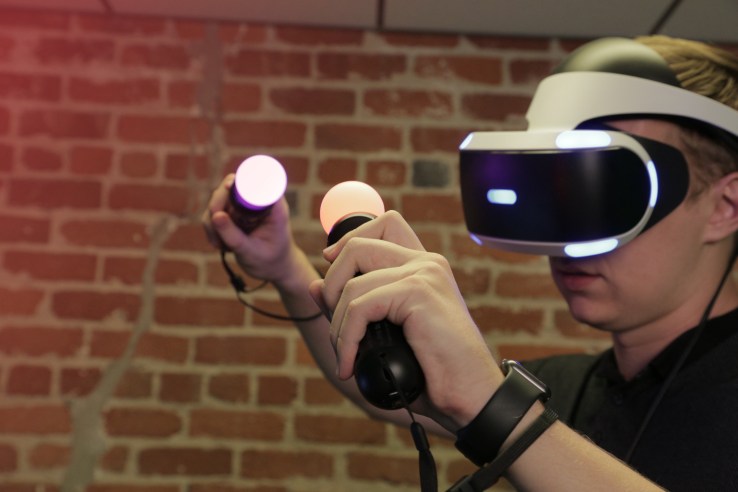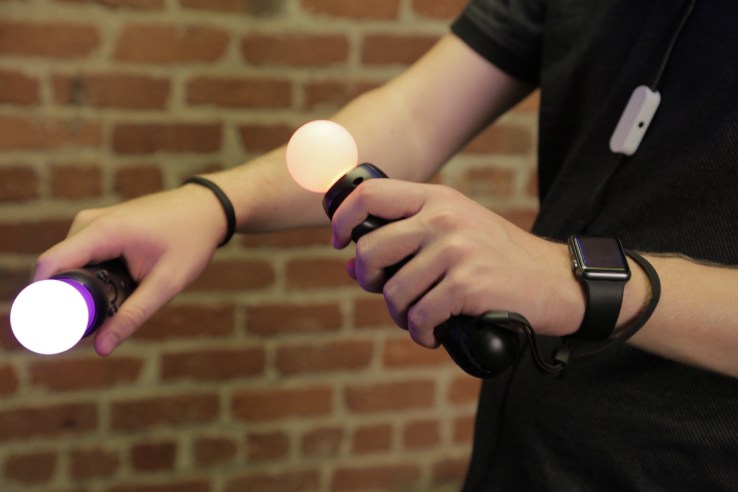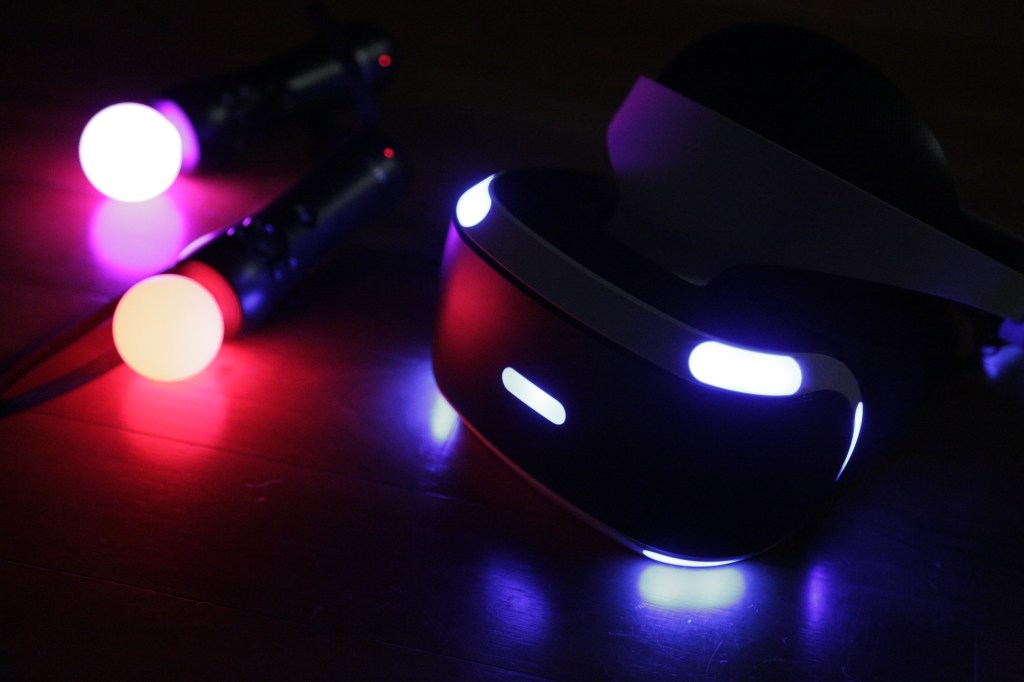Sometimes people take the future too seriously.
Virtual reality soothsayers have approached the technology as though they are treading on sacred ground and ushering in not only a new era of spatial computing but a new level of consciousness. Conversations that start with talking about dumb little mini-games lead to rabbit-hole ethical discussions. But what if instead of being a harbinger of a future utopia or dystopia, VR was just a hell of a lot of fun?
PlayStation VR isn’t a matrix gateway, it’s a toy that’s meant to entertain. Sony’s first-generation VR offering (officially launching October 13) may not push every technical benchmark, but it’s the most accessible piece of high-end VR hardware that’s been released yet — and it’s going to change the entire industry.
PS VR specs
+ Display resolution: 960×1080 OLED (each eye)
+ Display refresh rate: 90Hz or 120Hz depending on use
+ Field of view: approximately 100 degrees
+ Headset weight: Approx. 610g (excluding cable)
+ Price: $399 ($59 PlayStation camera is required)
Performance
Getting the PS VR up-and-running was a bit more complicated than I was expecting it to be. There are a lot of cords involved with this setup process thanks to the additional processor unit, which handles 3D audio processing while also splitting HDMI signals between the TV and PS VR display. The process was, in the end, certainly easier than setting up the HTC Vive, but it still seemed a bit cumbersome, though that’s likely because VR is generally pretty clunky to begin with.
After initial setup gets taken care of, it’s pretty smooth sailing. Sony opted to maintain the standard 2D PS4 system interface for the headset and, while it’s certainly not beautiful, it gets the job done and it’s a breeze to navigate.
I’ll say right away that the quality of VR Sony managed to yank out of the current generation PS4 is really impressive. While the PS VR display resolution that the system is powering is slightly lower than that of the Rift and Vive, the experience off the $300 PS4 didn’t feel too far off from my $1,000+ gaming PC. This begs to question what sort of performance the PS VR will see on the upcoming PlayStation 4 Pro, which will be released early next month.
The system itself did a great job handling the VR software, but I was less than pleased with some of the peripherals working alongside the headset.
I really wish they had shipped a better sensor than the PS camera to track the headset and controllers. Unfortunately, the field-of-view of the PlayStation camera generally isn’t expansive enough to pick up on everything in your play space. I’m a fairly tall dude at 6’3″ so I may have stretched the vertical limits of the camera, but it was a little odd that it could barely fit my whole body in it while I was standing in the center of my living room. The floor generally wasn’t fully tracked, so in games like Job Simulator when I dropped a virtual donut on the floor there wasn’t much that I could do. I tried quite a few setups and nothing seemed to hit that sweet spot, which was actually quite frustrating, given that it really limited me in a few titles.
Certain games seem more aware of this shortcoming than others. When I dropped a key on the floor in Batman: Arkham VR, it quickly appeared on a table in front of me. This isn’t a deal breaker or anything, but it’s odd that they wouldn’t have at least fixed this in the updated PS4 camera, which they only announced last month.
The Move controllers, which were originally introduced in 2010, certainly feel a bit dated in terms of tracking capabilities, but they actually performed better than I expected. The tracking works with the controllers (as well as the headset) thanks to their large glowing LEDs that are tracked by the PS camera. These are, again, not as good as the controllers for the Rift or Vive, but you can also buy one for $25 on Amazon, which is pretty crazy.

Design
PlayStation chose a much different route for the PS VR than the standard, bulky, black VR headset. The white-and-black HMD doesn’t strap to your head, it sits on top of it. The display can move away from the face, allowing you to check a message or put on a pair of glasses (which fit very well with the headset).
While I’m very intrigued by the headset design, I didn’t fall in love with its build-quality. The headband that you resize to secure the headset felt a bit janky, and the whole thing is a bit awkward to get on and off. I also found that light leakage differed heavily depending on the angle in which you put the headset on, so expect a decent amount of fidgeting before you get it just right.
Other than that, there’s not a whole lot to tell about the headset design. It doesn’t include integrated headphones like the Rift. It comes with a little pair of cheapo earbuds, so you’ll likely want to upgrade. It also doesn’t have IPD adjustment, so if your eyes are a little closer or further apart than most, you might have some difficulties with the lenses.

The shifting virtual tides
Let’s get one thing out of the way: The $399 PS VR headset is definitely in third-place after its other two main competitors, the Oculus Rift and the HTC Vive. Nevertheless, PS VR is still much more than a budget model, it’s a VR headset built for a defined audience on a platform that’s likely going to see increased importance.
Over the past several months, I’ve probably dissuaded more friends from buying VR gaming PCs than I’ve encouraged. VR is 100 percent something worth trying out, I tell them, but if you’ve never gone shopping for a high-end graphics card, now’s probably not the time to start. The main reasons for that have been:
- There’s not enough content out right now
- You just can’t really do anything useful in VR yet
- VR systems are really, really expensive
The content and utility problems are going to be figured out by creatives, but only time will tell when that all gets resolved. PlayStation certainly has a better soapbox than most for garnering the attention of establishment game studios to pursue VR projects. The PS VR’s launch titles are quite strong, but for most gamers it will take the addition of a major franchise like GTA or Call of Duty to get them on board. This all needs to happen soon.
While developers and designers figure content out, PlayStation will be aiding them in headset adoption thanks to the much more approachable economics of their console-powered headset. In fact, you can buy the entire PlayStation VR ecosystem, including the headset, PS4 system, motion controllers and camera sensor, for about $800. That’s huge.
I get that that’s still a ridiculous amount of money to spend on something like this, but with around 40-50 million PS4s out in the wild, and a fair share of Move controllers and PS cameras, it’s likely that a good amount of consumers will be able to get on the platform for less than $500.
With this effort from Sony, as well as Microsoft’s VR-ready Project Scorpio Xbox One coming out next year, there may be some tides turning against the PC as the main method of enjoying high-quality VR. Whether it’s mobile VR or console VR, it’s going to be increasingly clear to the people building these crazy headsets that if they want to get involved with this industry early, they’re going to have to approach consumers on platforms they’re already on.

Like
Competitive pricing. Intriguing design. Good comfort. No PC needed. Established position within Sony gaming ecosystem.
No like
Issues with controller tracking. So-so build quality. Lots of wires.
Bottom line
The PS VR is a truly transformative piece of consumer hardware. Virtual reality tech has existed for decades, but price has always held it back from the real-world users. At $399 for the headset and around $800 for the entire package, PlayStation VR finally takes the PC out of the equation and delivers positionally-tracked, high-quality VR to real consumers.






























Comment